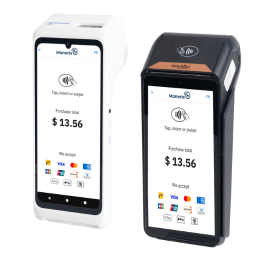
The Moneris Go suite: Commerce technology that works for your business
Learn how Moneris Go Terminal and Moneris Go PIN Pad help you accept payments faster, stay secure, and support mobility, fixed checkout, and growth across locations.

Choosing the right POS system for your business in Winnipeg can be a game-changer. Whether you're running a cozy café, a bustling retail store, or a trendy restaurant, the right POS system can streamline your operations, enhance customer experience, and boost your bottom line. But with so many options available, how do you find the perfect fit? This guide will walk you through everything you need to know about POS systems, helping you make an informed decision.
Before diving into the specifics, let's clarify what a POS system is. A Point of Sale (POS) system is a combination of hardware and software that allows businesses to process transactions and manage various aspects of their operations. Modern POS systems go beyond simple transaction processing; they offer features like inventory management, customer relationship management (CRM), sales reporting, and more.
In today's fast-paced business environment, having a reliable and efficient POS system is crucial. Here are some reasons why:
When searching for the right POS system for your business in Winnipeg, it's essential to consider several key features to ensure the system meets your needs and supports your business growth. Here’s an expanded look at these critical features:
A POS system should be intuitive and user-friendly, allowing your staff to learn and operate it with minimal training. An easy-to-use interface reduces the likelihood of errors during transactions and enhances the overall efficiency of your operations. Systems with touch-screen capabilities, clear menu layouts, and straightforward navigation can significantly improve the user experience, making it easier for employees to manage sales, inventory, and customer interactions seamlessly.
Integration capabilities are crucial for a POS system, as they allow it to work seamlessly with other tools and software you use in your business. This includes accounting software, eCommerce platforms, and Customer Relationship Management (CRM) systems. Integrations help streamline operations by ensuring data flows smoothly between different systems, reducing manual data entry, and minimizing errors. For instance, integrating your POS with accounting software can automate financial reporting and tax calculations, while eCommerce integration can unify online and in-store sales data, providing a comprehensive view of your business performance.
Scalability is a vital feature for any growing business. A scalable POS system can adapt to your business's changing needs, whether you're expanding to new locations, adding new products, or increasing transaction volumes. Look for systems that allow you to add new terminals, users, and features without significant downtime or additional costs. Cloud-based POS systems are particularly advantageous in this regard, as they offer real-time updates and can handle data expansion effortlessly, ensuring your business can scale up or down as needed.
Reliable customer support is essential for resolving any issues that may arise with your POS system. Look for providers that offer 24/7 support through various channels, such as phone, email, and live chat. Comprehensive support ensures that any technical problems can be addressed promptly, minimizing downtime and maintaining smooth business operations. Additionally, providers that offer extensive training resources, such as tutorials, webinars, and user manuals, can help your staff get the most out of the POS system.
A robust POS system should support a variety of payment methods to cater to different customer preferences. This includes traditional credit and debit card payments, as well as modern options like contactless payments and mobile wallets. Supporting multiple payment methods not only enhances customer convenience but also speeds up the checkout process, reducing wait times and improving customer satisfaction. Ensure the POS system complies with the latest security standards, such as PCI DSS, to protect sensitive payment information and prevent fraud.
While the above features are fundamental, there are other aspects to consider when choosing a POS system:
By carefully evaluating these features, you can select a POS system that not only meets your current needs but also supports your business's future growth and success.
Choosing the right POS system for your business is a critical decision that can significantly impact your operations, customer experience, and overall efficiency. Here’s a detailed guide to help you navigate this process effectively:
The first step in selecting the right POS system is to thoroughly assess your business needs. Start by identifying your current pain points and the specific requirements you have for a POS system. Consider the size of your business, the industry you operate in, and any unique needs that are specific to your operations. For instance, a restaurant might need table management and kitchen order routing features, while a retail store might prioritize inventory management and customer relationship management (CRM) capabilities. Understanding these needs will help you narrow down your options and focus on systems that can address your specific challenges and goals.
Once you have a clear understanding of your business needs, the next step is to research and compare different POS systems available in the market. Look for systems that meet your criteria and offer the features you need. Read customer reviews and ratings on trusted review websites to get an idea of the reliability and performance of different systems. Additionally, seek recommendations from other business owners in your industry or join online forums where entrepreneurs discuss their experiences with various POS systems. This research will provide valuable insights and help you create a shortlist of potential options.
Evaluating the total cost of ownership is crucial when choosing a POS system. This includes not only the upfront costs of hardware and software but also ongoing expenses such as transaction fees, maintenance, and support costs. Some POS systems may have hidden fees, so it’s important to understand all potential costs clearly. While it might be tempting to opt for the cheapest option, investing in a high-quality POS system can yield long-term benefits in terms of efficiency, productivity, and customer satisfaction. Make sure to balance cost considerations with the features and capabilities that are essential for your business.
Before making a final decision, testing the POS system in your business environment is important. Many providers offer free trials or demos, which allow you to evaluate the system’s functionality and ease of use. During the trial period, involve your staff in testing the system to gather feedback on its usability and performance. This hands-on experience will help you determine whether the system meets your needs and integrates well with your existing processes. Pay attention to how intuitive the interface is, how quickly transactions can be processed, and how well the system handles your specific business requirements.
Reliable customer support and comprehensive training are essential for a smooth transition to a new POS system. Ensure that the provider offers robust support options, including phone, email, and live chat, and that they are available 24/7 to assist with any issues that may arise. Additionally, look for providers that offer extensive training resources, such as tutorials, webinars, and user manuals, to help your staff get up to speed quickly. Good support and training can make a significant difference in how effectively your team can use the POS system and can help minimize downtime and disruptions to your business operations.
By following these steps, you can approach the process of choosing a POS system methodically and confidently. Assessing your business needs, researching and comparing options, considering costs, testing the system, and ensuring robust support and training will help you select a POS system that aligns with your goals and supports your business’s growth and success.
Remember, a modern POS system is more than just a tool for processing transactions. It's an integral part of your business operations that can provide valuable insights, improve efficiency, and help you deliver exceptional customer experiences. So take the time to research, compare, and test different systems to find the perfect fit for your business. For more information on how Moneris can help you find the right POS system, visit their website and explore their range of payment solutions designed to meet the needs of businesses of all sizes.

Learn how Moneris Go Terminal and Moneris Go PIN Pad help you accept payments faster, stay secure, and support mobility, fixed checkout, and growth across locations.

If you’re ready to turn your passion into profit, here’s what you need to know about starting a side hustle in Canada.

Learn why a POS system is essential for small quick service restaurants and which features help streamline orders, boost sales, and keep your café running smoothly.

Discover the best POS systems for small retail businesses. Learn how to streamline inventory, boost sales, and improve customer service with the right POS solution.